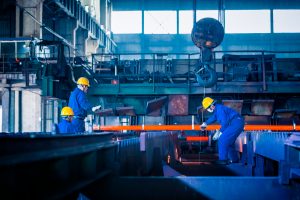Master's Program in Metallurgical Engineering

In Department of Metallurgical Engineering (MG-ITB), students will learn the principles and applications of physics, mathematics and chemistry as well as engineering for:
- Separating the valuable minerals from the impurities in the ore (product of mining), so that it is technically and economically feasible to be extracted. This includes coal processing and washing, extracting valuable metals, smelting and refining them into pure metals, such as gold, silver, tin, copper, aluminum, iron.
- Combining metals with other elements to form metal alloys, eg steel, stainless steel, aluminum alloys, brass, nickel alloys, superalloys.
- Metal forming and improving the microstructure of metal alloys through heat treatment to obtain the required properties in the application.
- The relationship between microstructure and the properties of metals and their alloys, for example the effect of carbide particles on the strength and corrosion resistance of steel.
The Department of Metallurgical Engineering was officially opened at ITB in April 2016, although Metallurgical Engineering education has been taught for a long time as a special field in the Mining Engineering Masters Study Program. During its development, the Metallurgical Engineering Masters Study Program has obtained B accreditation from BAN-PT (2018-2023).
The educational objectives of the Department of Metallurgical Engineering are to produce masters in metallurgy who:
- Have high integrity and personality and have the ability to guide the group and the profession as well as have professional ethics, especially in efforts to increase the added value of mining products through domestic processing and refining.
- Having the ability to provide input at the design and production stages in the metallurgical industry, especially with regard to demands for process efficiency, increasing productivity, improving product quality and minimizing negative impacts on the environment.
- Have the ability to develop research science and technology in solving problems related to metallurgical design and processes, and be able to produce innovations in the development of metallurgical science and technology.
Prospek Kerja
Metallurgical Engineering alumni have worked in various fields of work such as in the mining industry (PT. Freeport, PT. Aneka Tambang, PT. Newmont Nusa Tenggara, PT. Kaltim Prima Coal, PT. Berau Coal, cement industry), steel industry (PT. Krakatau Steel/Posco), metal extraction industry (PT. VALE, PT. Aneka Tambang, PT. Timah, PT. INALUM, PT. Smelting), manufacturing, oil and gas industry (PT. PERTAMINA, PT. Halliburton), consulting services company , marketing, government (tekMIRA), research institutes (BRIN), and universities (ITSB, ITERA).
